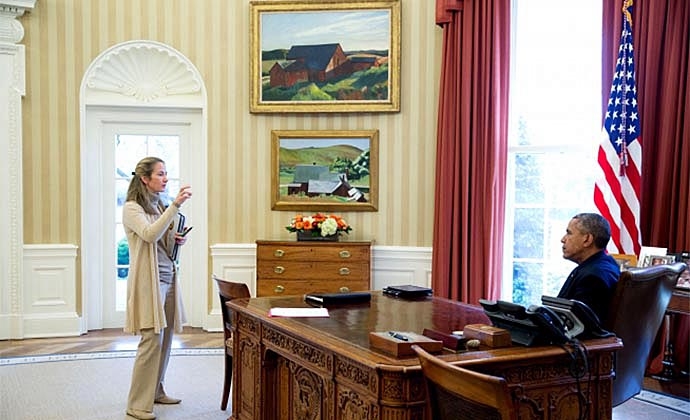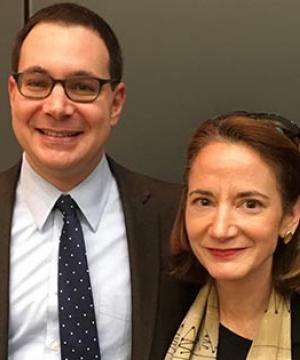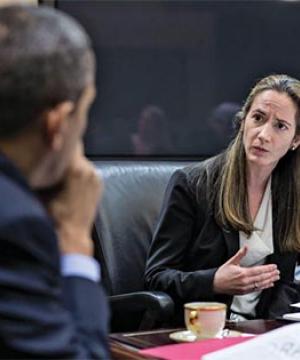A Top Intelligence Officer Joins the Law School
White House veteran Avril Haines named a fellow at the Human Rights Institute and National Security Law Program, and a senior researcher for Columbia World Projects.
Avril Haines, a former deputy director of the CIA who also served as deputy national security adviser to President Obama, made her debut as a fellow at Columbia Law School on November 9, at a lunchtime talk sponsored by the National Security Law Society. Before a rapt audience in a packed auditorium in Jerome Greene Hall, Haines offered insights into U.S. national security strategy regarding China, Iran, and North Korea.
Sharing the dais with Professor Matthew Waxman, the co-director of the Law School’s National Security Law Program, she recalled the most extraordinary day in her years working for President Obama: On June 26, 2015, there was a terrorist attack in Tunisia that required their immediate attention; the Supreme Court overturned the Defense of Marriage Act; and the president traveled to South Carolina where he delivered a eulogy and memorably sang “Amazing Grace” at the funeral of Reverend Clementa Pinckney who’d been murdered in a mass shooting at the Emanuel African Methodist Episcopal Church in Charleston, S.C. “It was a remarkable experience,” she said of being by the president’s side on such a momentous day. “He felt things so deeply.”
During the Obama administration, Haines broke two glass ceilings: She was not only the first woman to hold the number two position at the CIA but also the first female White House deputy national security adviser. (Coincidentally, she was replacing Columbia Law alumnus Antony Blinken ’88 in the NSA role when he became deputy secretary of state.)
A Perch at the University
Now, she is assuming a vast portfolio in her first foray into academia. She has been named a senior fellow at both the Law School’s Human Rights Institute and National Security Law Program. During the spring 2018 semester, she will be teaching a seminar on national security. In addition, she has been appointed the inaugural Senior Researcher for Columbia World Projects (CWP), which was established in April by University President Lee C. Bollinger ’71.
“The concept behind Columbia World Projects is to bring extraordinary scholarship to bear on the most basic fundamental challenges that we are facing today in the policy world,” Haines said in an interview last week. “It struck me that this would be the perch to step back from the policy world and have an opportunity to think more deeply and about the bigger picture while at the same time having an impact on the real world.”
Haines said she believes that there needs to be a more active dialogue between scholars and politicians. “I definitely saw inside the government just how much we are in need of strategic thinking and institutions that are capable of strategic thinking to bring their good work to government and other areas. I’d like to see universities get better at policy and encourage real conversations as opposed to the way it works today, which I think is less than ideal.”
From Baltimore Bookstore to CIA
Haines is a bona fide Washington D.C. insider, but her path to the top tier of the U.S. government was circuitous and unconventional. (In 2013, Newsweek magazine called her “the least likely spy.”) A native of New York City, Haines spent the year after high school at an elite judo academy in Japan, earning her brown belt. While pursuing a degree in physics at the University of Chicago, she took time off to study aviation; her flight instructor, David Davighi, would eventually become her husband.
Upon graduating from the University of Chicago in 1992, she and Davighi moved to Baltimore where they opened a bookstore/cafe in the transitional Fells Point neighborhood. She became a community activist and president of the local business association, which inspired her to apply to law school. “I realized it was the lawyers who were sitting around the table who understood how to create change,” she said. “Lawyers better understand institutions and how to pull the levers to get things done.”
When she graduated from Georgetown Law in 2001, she worked at the Hague Conference on Private International Law and clerked for a U.S. Court of Appeals judge. She then joined the State Department in 2003, and in 2006, she went to Iraq to work with State Department Legal Adviser John B. Bellinger III. Upon her return to the U.S., she went to the Hill as deputy counsel for the Senate Foreign Relations Committee, which was chaired by Joe Biden.
In 2008, she re-joined the State Department where she ran the Office of Treaty Affairs. “It’s a remarkable place,” she said. “It is so cool because you go into this vault, and it has all these negotiating records going back to the beginning of our country, and you find things like the Instruments of Surrender from World War II. To be able to touch some of these treaties signed by our founding fathers is incredible.”
The Columbia Connection
During her time at the treaty office, Haines got to know Columbia Law School Professor Sarah Cleveland, the faculty co-director of the Human Rights Institute, who was then Counselor on International Law with the Office of the Legal Adviser of the U.S. State Department. “She is just amazing, and I expect I will be co-teaching with her next year,” said Haines, who also plans to co-teach a class with Waxman, with whom she worked in Washington when he was at the State and Defense Departments. And she looks forward to reuniting with Professor Philip Bobbitt, co-director of the National Security Law Program, with whom she often consulted when she worked at the White House.
Haines is eager to work with Columbia Law School students. “I see these kids and they are astounding,” she said. “It’s exciting because as much as what’s going on in the world depresses me. I look at the generation coming up and find them inspiring and thoughtful. They do seem very interested in changing the world and making it a better place and thinking about things in a serious way.”
As for Columbia World Projects, which is being led by Nicholas Lemann, the dean emeritus of the Columbia Journalism School, Haines has a broad mission. Her role is to promote conversations among scholars and practitioners and organize forums on "fundamental challenges,” she said. "You bring together the stars looking at an issue—and many of them are at Columbia—and begin to generate a conversation between the scholars and the folks in the real world and pick projects that not just impact people but also add to the scholarship on the topic.”
Haines—who was once called “as caring and decent a person as I’ve ever had the blessing to work with” by former White House Chief of Staff Denis McDonough—is humble about her new roles and the seriousness of the issues at hand. “It’s both inspiring and daunting,” she said. “It kind of makes your head hurt.”
###
Posted on November 14, 2017


